UC Press is proud to publish award-winning authors and books across many disciplines. Below are several of our March 2023 award winners. Please join us in celebrating these scholars by sharing the news!
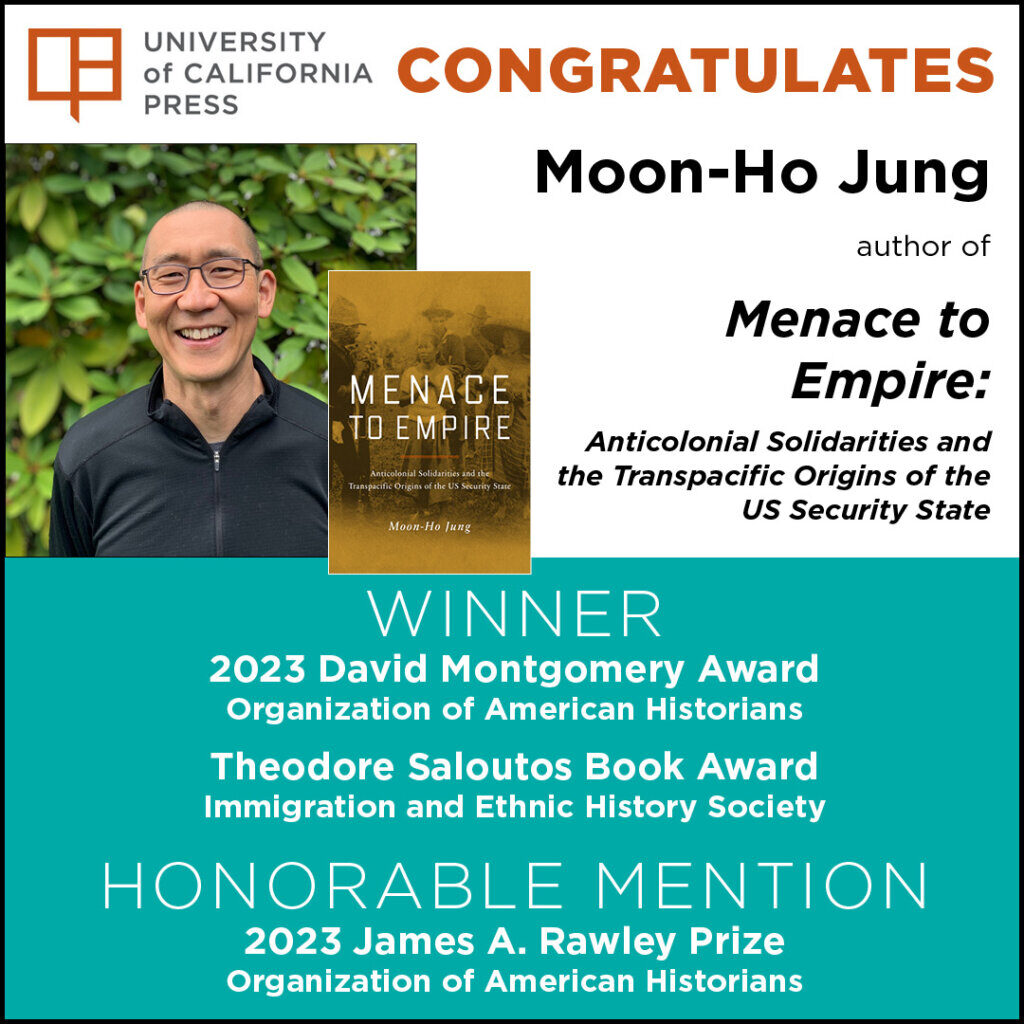
Moon-Ho Jung
2023 David Montgomery Award Winner Organization of American Historians
Theodore Saloutos Book Award Winner Immigration and Ethnic History Society
2023 James A. Rawley Prize Honorable Mention Organization of American Historians
Moon-Ho Jung is Professor of History at the University of Washington and the author of Coolies and Cane: Race, Labor, and Sugar in the Age of Emancipation.
Menace to Empire: Anticolonial Solidarities and the Transpacific Origins of the US Security State
Menace to Empire transforms familiar themes in American history. This profoundly ambitious history of race and empire traces both the colonial violence and the anticolonial rage that the United States spread across the Pacific between the Philippine-American War and World War II. Moon-Ho Jung argues that the US national security state as we know it was born out of attempts to repress and silence anticolonial subjects, from the Philippines and Hawaiʻi to California and beyond.
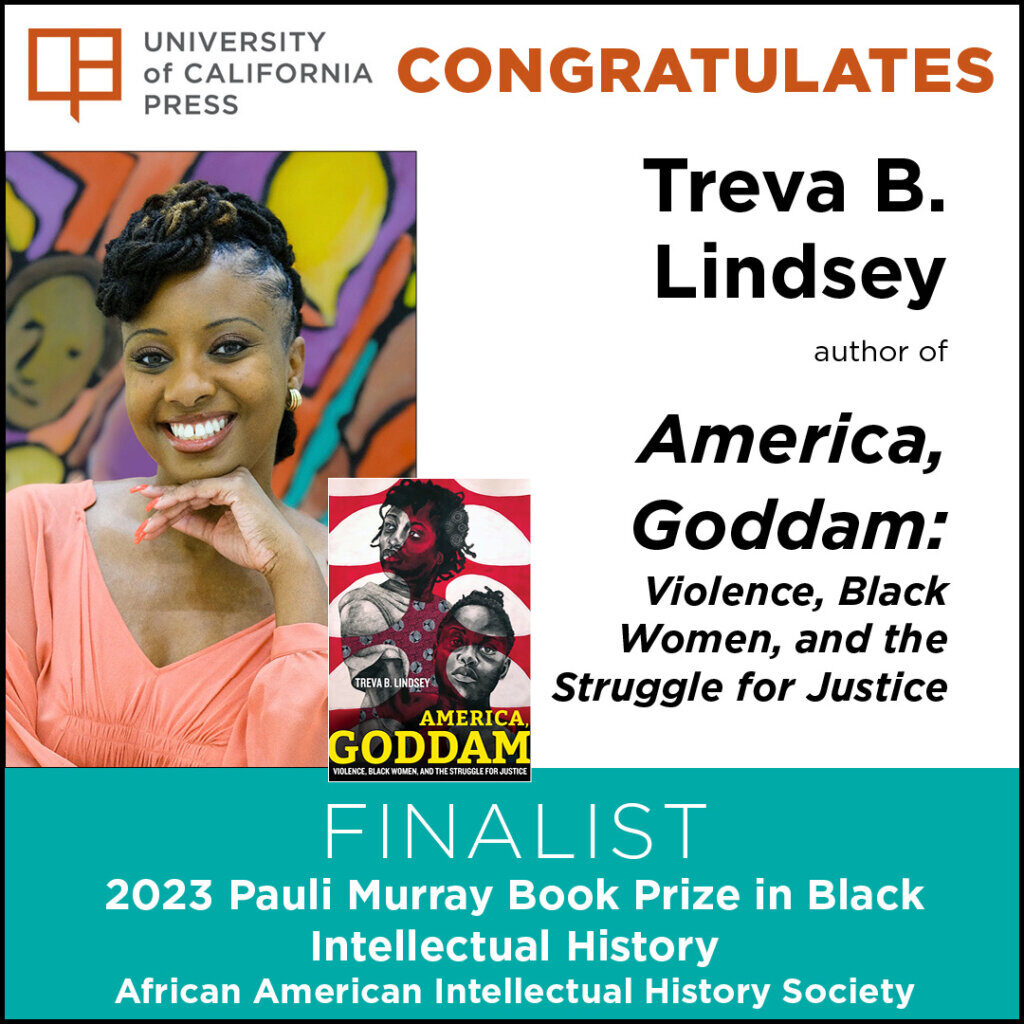
Treva B. Lindsey
2023 Pauli Murray Book Prize in Black Intellectual History, Finalist
African American Intellectual History Society
Treva B. Lindsey is Associate Professor in the Women’s, Gender, and Sexuality Studies Department at Ohio State University and founder of the Transformative Black Feminism(s) Initiative in Columbus, Ohio.
America, Goddam: Violence, Black Women, and the Struggle for Justice
Through personal accounts and hard-hitting analysis, Black feminist historian Treva B. Lindsey starkly assesses the forms and legacies of violence against Black women and girls, as well as their demands for justice for themselves and their communities. Combining history, theory, and memoir, America, Goddam renders visible the gender dynamics of anti-Black violence. Black women and girls occupy a unique status of vulnerability to harm and death, while the circumstances and traumas of this violence go underreported and understudied. America, Goddam allows readers to understand
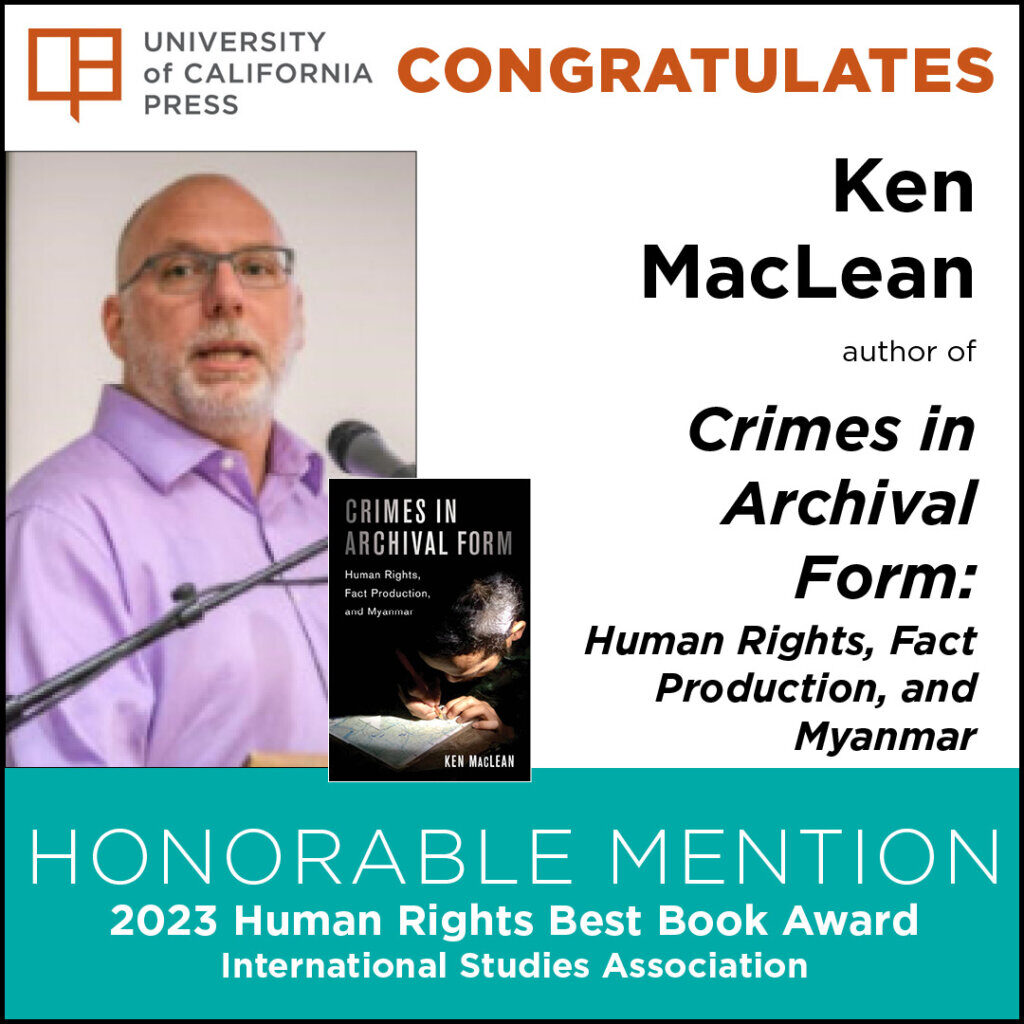
Ken MacLean
2023 Human Rights Best Book Award, Honorable Mention
International Studies Association
Ken MacLean is a Professor at the Strassler Center for Holocaust and Genocide Studies, Clark University. He has more than two decades of experience researching state-sponsored violence, human rights violations, and conflict-induced displacement in Myanmar.
Crimes in Archival Form: Human Rights, Fact Production, and Myanmar
Crimes in Archival Form explores the many ways in which human rights “facts” are produced rather than found. Using Myanmar as his case study, Ken MacLean examines the fact-finding practices of a human rights group, two cross-border humanitarian agencies, an international law clinic, and a global NGO-led campaign. Foregrounding fact-finding, in critical yet constructive ways, prompts long overdue conversations about the possibilities and limits of human rights documentation as a mode of truth-seeking. Such conversations are particularly urgent in an era when the perpetrators of large-scale human rights violations exploit misinformation, weaponize disinformation, and employ outright falsehoods, including deepfakes, to undermine the credibility of those who document abuses and demand accountability in the court of public opinion and in courts of law. MacLean compels practitioners and scholars alike to be more transparent about how human rights “fact” production works, why it is important, and when its use should prompt concern.
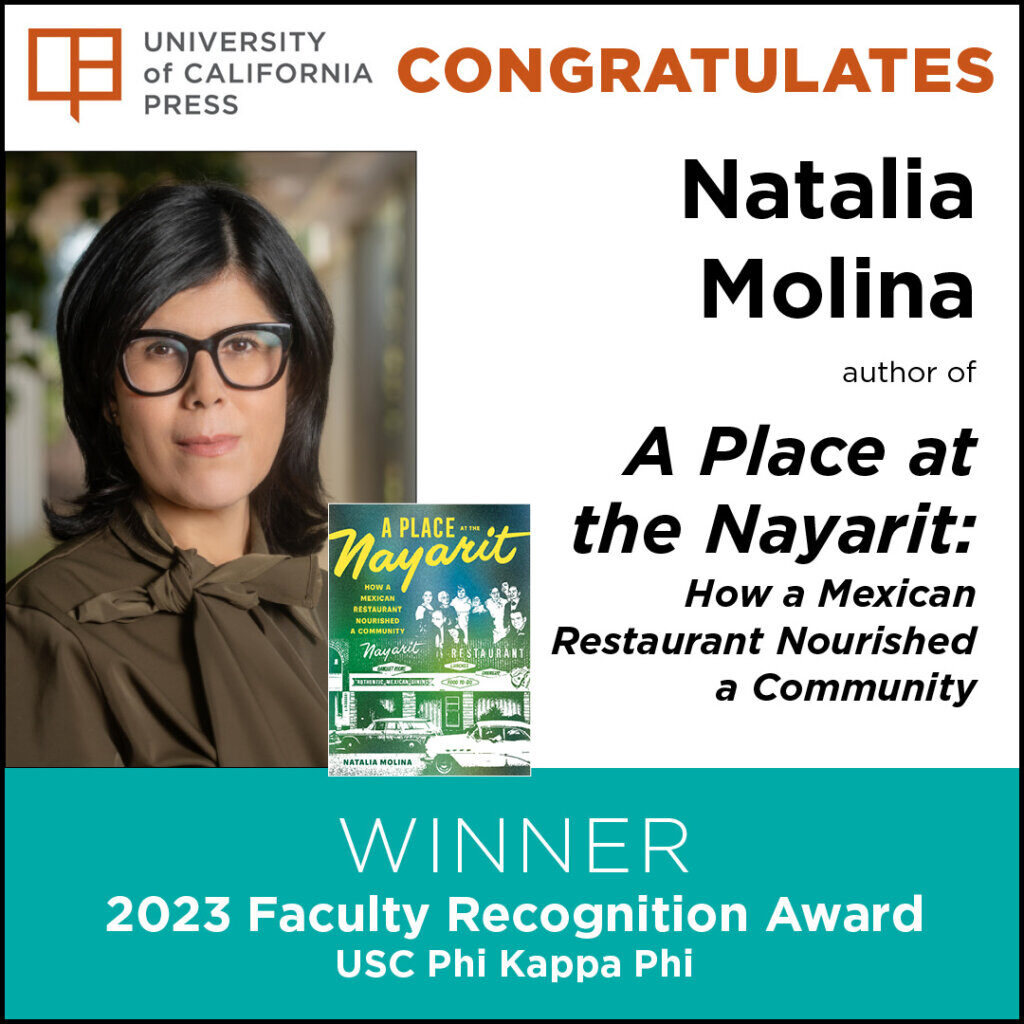
Natalia Molina
2023 Faculty Recognition Award, Winner
USC Phi Kappa Phi
Natalia Molina is Distinguished Professor of American Studies and Ethnicity at the University of Southern California and is a 2020 MacArthur Fellow. She is the author of the award-winning books How Race Is Made in America: Immigration, Citizenship, and the Historical Power of Racial Scripts and Fit to Be Citizens? Public Health and Race in Los Angeles, 1879–1939 and coeditor of Relational Formations of Race: Theory, Method, and Practice.
A Place at the Nayarit: How a Mexican Restaurant Nourished a Community
MacArthur Genius Natalia Molina unveils the hidden history of the Nayarit, a restaurant in Los Angeles that nourished its community of Mexican immigrants with a sense of belonging.
In 1951, Doña Natalia Barraza opened the Nayarit, a Mexican restaurant in Echo Park, Los Angeles. With A Place at the Nayarit, historian Natalia Molina traces the life’s work of her grandmother, remembered by all who knew her as Doña Natalia––a generous, reserved, and extraordinarily capable woman. Doña Natalia immigrated alone from Mexico to L.A., adopted two children, and ran a successful business. She also sponsored, housed, and employed dozens of other immigrants, encouraging them to lay claim to a city long characterized by anti-Latinx racism. Together, the employees and customers of the Nayarit maintained ties to their old homes while providing one another safety and support.
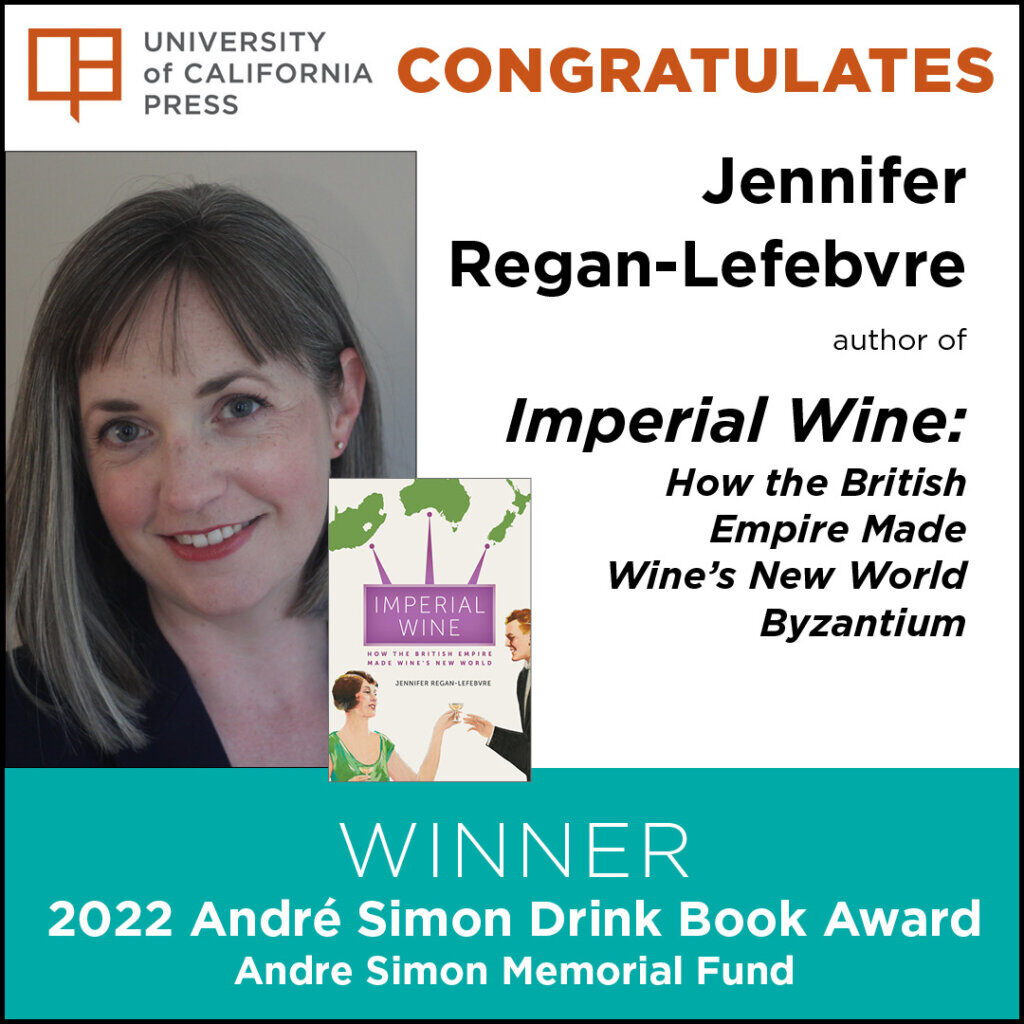
Jennifer Regan-Lefebvre
2022 André Simon Drink Book Award, Winner
André Simon Memorial Fund
Jennifer Regan-Lefebvre is Professor of History at Trinity College, Connecticut, and author of Cosmopolitan Nationalism in the Victorian Empire. In 2019 she was named one of the “Future 50” of wine by the Wine & Spirit Education Trust and the International Wine and Spirit Competition.
Imperial Wine: How the British Empire Made Wine’s New World
A fascinating and approachable deep dive into the colonial roots of the global wine industry.
Imperial Wine is a bold, rigorous history of Britain’s surprising role in creating the wine industries of Australia, South Africa, and New Zealand. Here, historian Jennifer Regan-Lefebvre bridges the genres of global commodity history and imperial history, presenting provocative new research in an accessible narrative. This is the first book to argue that today’s global wine industry exists as a result of settler colonialism and that imperialism was central, not incidental, to viticulture in the British colonies.
Wineries were established almost immediately after the colonization of South Africa, Australia, and New Zealand as part of a civilizing mission: tidy vines, heavy with fruit, were symbolic of Britain’s subordination of foreign lands. Economically and culturally, nineteenth-century settler winemakers saw the British market as paramount. However, British drinkers were apathetic towards what they pejoratively called “colonial wine.” The tables only began to turn after the First World War, when colonial wines were marketed as cheap and patriotic and started to find their niche among middle- and working-class British drinkers. This trend, combined with social and cultural shifts after the Second World War, laid the foundation for the New World revolution in the 1980s, making Britain into a confirmed country of wine-drinkers and a massive market for New World wines. These New World producers may have only received critical acclaim in the late twentieth century, but Imperial Wine shows that they had spent centuries wooing, and indeed manufacturing, a British market for inexpensive colonial wines. This book is sure to satisfy any curious reader who savors the complex stories behind this commodity chain.
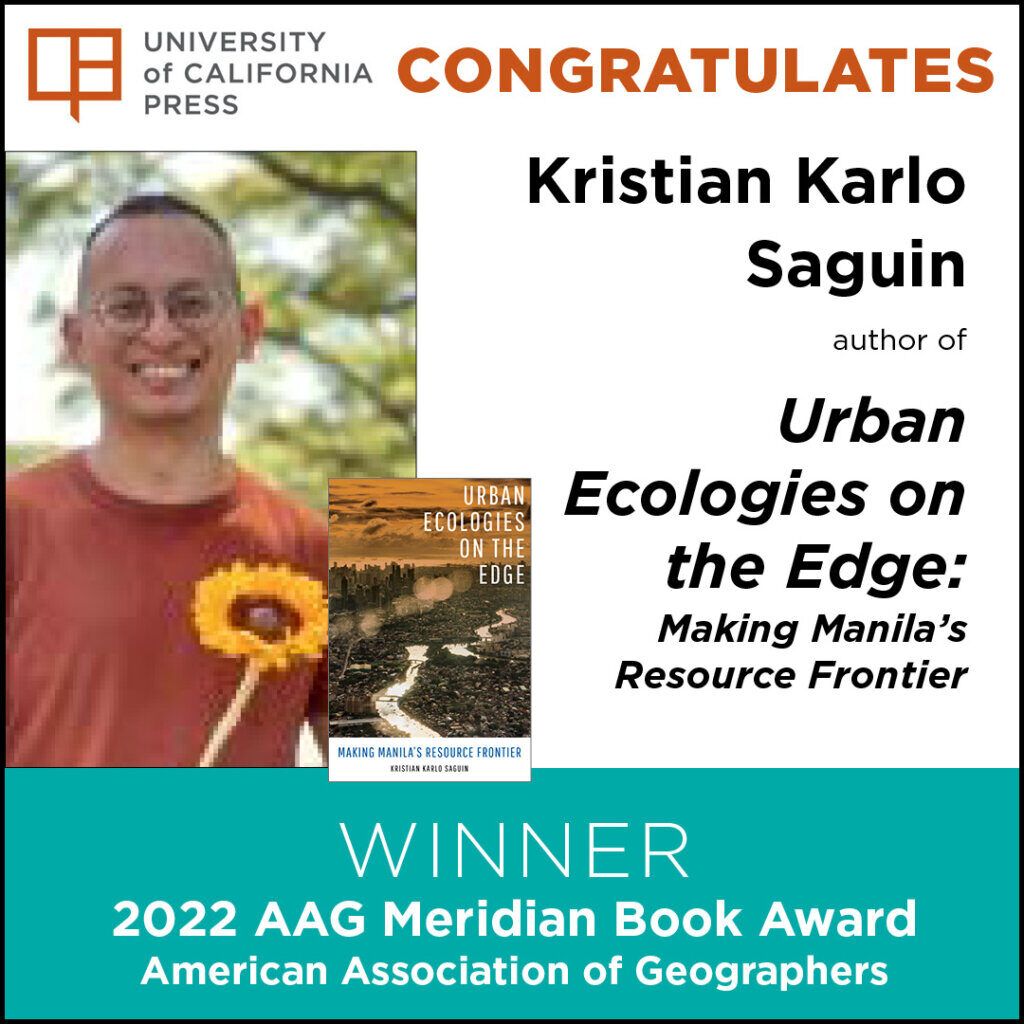
Kristian Karlo Saguin
2022 AAG Meridian Book Award, Winner
American Association of Geographers
Kristian Karlo Saguin is Associate Professor of Geography at the University of the Philippines.
Urban Ecologies on the Edge: Making Manila’s Resource Frontier
Laguna Lake, the largest lake in the Philippines, supplies Manila’s dense urban region with fish and water while operating as a sink for its stormflows and wastes. Transforming the lake to deliver these multiple urban ecological functions, however, has generated resource conflicts and contradictions that unfold unevenly across space.
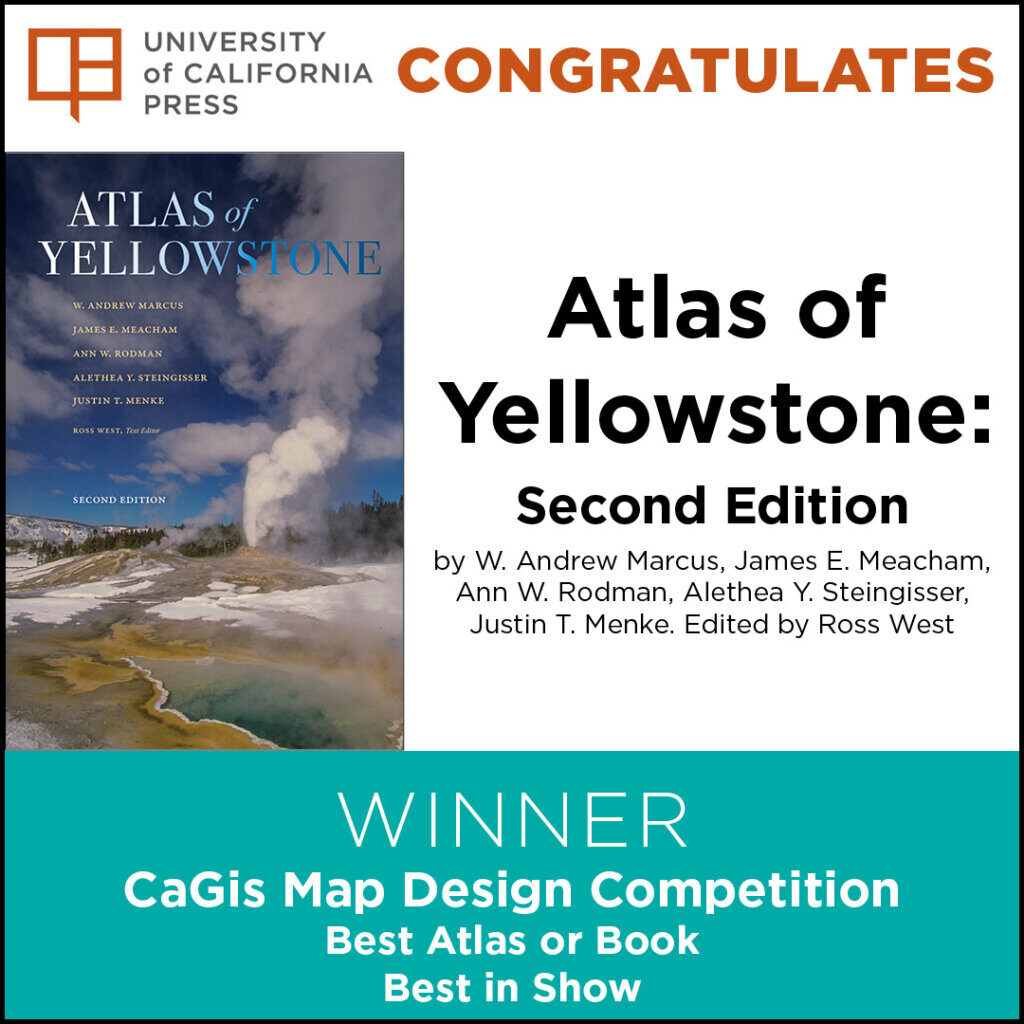
Atlas of Yellowstone: Second Edition
2022 CaGis Map Design Competition, Winner
Best Atlas or Book in Show
W. Andrew Marcus is Professor Emeritus, Department of Geography at the University of Oregon.
James E. Meacham is Senior Research Associate and InfoGraphics Lab Director in the Department of Geography at the University of Oregon.
Ann W. Rodman is GIS Manager at Yellowstone National Park.
Alethea Y. Steingisser is Cartographic Production Manager in the Department of Geography at the University of Oregon.
Justin T. Menke is Graduate Researcher and Cartographer in the Department of Geography at the University of Oregon.
Atlas of Yellowstone: Second Edition
The second edition of the award-winning Atlas of Yellowstone contains 50% new material, making it the authoritative reference for the world’s first national park on its 150th anniversary.
The publication of the Atlas of Yellowstone, Second Edition coincides with the 150th anniversary of the founding of Yellowstone National Park—a major international event. The atlas is an accessible, comprehensive guide that presents Yellowstone’s story through compelling visualizations rendered by award-winning cartographers at the University of Oregon. Readers of this new edition of the Atlas of Yellowstone will explore the contributions of Yellowstone to preserving and understanding natural and cultural landscapes, to informing worldwide conservation practices, and to inspiring national parks around the world, while also learning about the many struggles the park faces in carrying out its mission. Ranging from Indigenous Americans and local economies to geysers and wildlife migrations, from the life of one wolf to the threat of wildfires, each page provides leading experts’ insights into the complexity and significance of Yellowstone. Key elements of the atlas include:
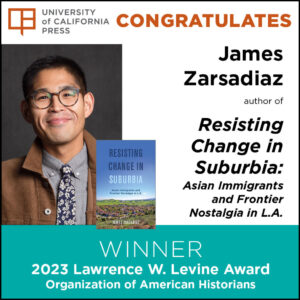
James Zarsadiaz
2023 Lawrence W. Levine Award, Winner
Organization of American Historians
James Zarsadiaz is Associate Professor of History and Director of the Yuchengco Philippine Studies Program at the University of San Francisco.
Resisting Change in Suburbia: Asian Immigrants and Frontier Nostalgia in L.A.
2023 Lawrence W. Levine Award Winner, Organization of American Historians
Between the 1980s and the first decade of the twenty-first century, Asian Americans in Los Angeles moved toward becoming a racial majority in the communities of the East San Gabriel Valley. By the late 1990s, their “model minority” status resulted in greater influence in local culture, neighborhood politics, and policies regarding the use of suburban space. In the “country living” subdivisions, which featured symbols of Western agrarianism including horse trails, ranch fencing, and Spanish colonial architecture, white homeowners encouraged assimilation and enacted policies suppressing unwanted “changes”—that is, increased density and influence of Asian culture. While some Asian suburbanites challenged whites’ concerns, many others did not. Rather, white critics found support from affluent Asian homeowners who also wished to protect their class privilege and suburbia’s conservative Anglocentric milieu. In Resisting Change in Suburbia, award-winning historian James Zarsadiaz explains how myths of suburbia, the American West, and the American Dream informed regional planning, suburban design, and ideas about race and belonging.